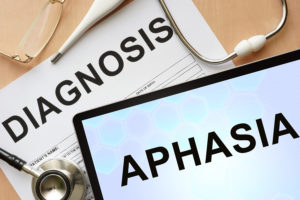Four Tips to Help Adults with Aphasia Communicate

Aphasia is a specific type of communication disorder. Your family member may have a difficult time understanding words or coming up with them in conversation. She may struggle to find the correct words in given situations. Aphasia makes communication extremely difficult. It’s often a result of stroke, but can also accompany developmental disabilities.
Use Props for Common Words and Phrases
Sometimes props can function as a shortcut for your family member when she’s trying to say something specific, especially if it’s a word or phrase that you use often together. These can be actual items or pictures of those items. It can be easier for your family member to point to or to pick up an item than it can be for her to articulate the word for the object.
Use a Notepad for More Complicated Communication
In some cases, if you write something down or if your family member writes something down, that makes communication that much easier. Keeping a notepad handy also allows you to refer to previous conversations that might have been helpful recently. You can also take notes on different observations you’re making about your family member’s ability to communicate.
Speak Slowly and Try to Keep the Conversation Calm
Often when conversations become difficult because of aphasia that complicates everything even more. Do what you can to keep the conversation calm. Speak slowly and with an even tone. This can usually help to adjust the overall tone, even if you’re talking about something very commonplace. If your family member is having a particularly difficult time talking, slow down and take a time out for a little bit. Revisiting the conversation after a bit of a rest can help.
Keep a Description of Aphasia Handy When Out and About
Other people may not always understand aphasia or how it affects your family member’s ability to communicate. It can help to carry a card or pamphlet with you that gives people information about aphasia. You may find that people are more willing to be patient and helpful than you suspect. It’s sometimes easier to assume the worst than it is to hope for the best. Education can do a lot in those situations, though.
Home care for adults with developmental disabilities can help your family member cope with aphasia. Her speech therapists and other professionals may offer her tools to use, and home care providers can make those tools easier to access on a daily basis.
If you are considering residential habilitation in Brownsburg, IN, please call the caring staff at RSI Cares. Serving Greater Indianapolis Area. Call for Immediate Info & Assistance: 317-471-0750.
- NOTICE: Indiana Direct Service Workforce Investment Grant - January 30, 2023
- Take a Break and Let Respite Care Aides Help Out - November 10, 2021
- Let Residential Habilitation Services Bring Independence to Your Child With Down Syndrome - October 20, 2021
